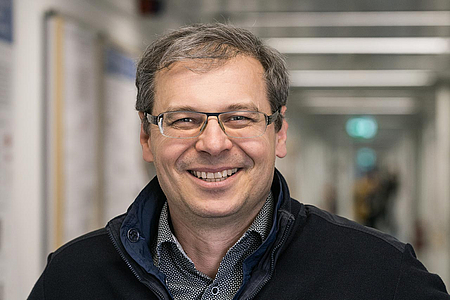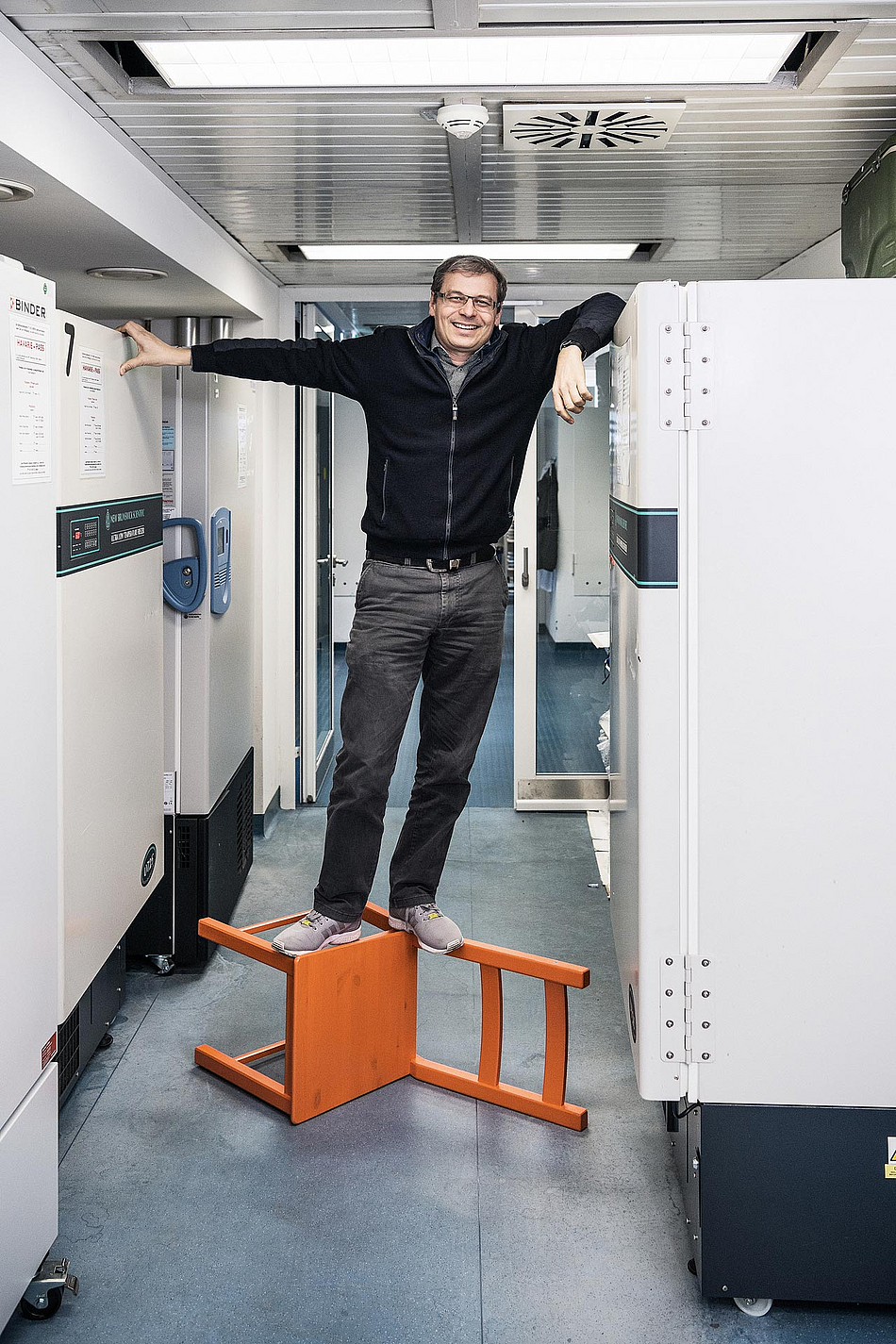Sensitivity for Alzheimer research
How much imagination does one actually need to design research projects about particles that you can’t even see? And how do the realizations gained from such a project ultimately reach the patient? We talked about this and other questions with the biochemist Erich Wanker, who is researching the mechanisms underlying neurodegenerative diseases like Parkinson’s, Alzheimer’s or Huntington’s chorea.
Professor Wanker, have you in fact always wanted to be a researcher?
I grew up in the country. At that time, there were still very few kindergartens, so all day I used to go on voyages of discovery in nature. There, I was able to create my own world. So my interest in discovering things was already apparent back then. Of course, I say that with a twinkle in my eye!
So, did you want to go into the field of molecular biology because it’s still possible to discover many new things there?
I’m primarily interested in how life functions. I’m fascinated by cells and biological processes – that is, what has to occur for a living organism to exist at all. You can’t see molecules, so you really have to enjoy doing it and be able to come up with an idea. In short – you need to be a little mad, in the sense of having imagination.
Is your profession as rewarding in actuality as you expected?
As a scientist, you can constantly discover new things, you can form and test hypotheses. It’s mainly a matter of recognizing connections – such as how molecules in the organism interact and communicate with one another. The end result is a medication or diagnostic technique, or else you simply understand the biology better. In this way, you’re contributing to social progress. Of course, great things don’t happen every day. In research, you frequently face setbacks too. You sometimes work for months or years to find the right approach to solving something.
What are you currently researching?
My research group is studying neurodegenerative diseases, such as Huntington’s chorea, Alzheimer’s or Parkinson’s. Our main objective is to understand the molecular mechanisms that underlie these diseases better: what happens with the disease at the level of the genes and/or the proteins? To find out, we look at different model systems in the test tubes, in cells, in the fly or in the threadworm – depending on what question we’re working on.
Does that mean you’re not necessarily trying to find a remedy?
Oh yes, we are. If we answer questions at the molecular level, we’re contributing towards the development of therapeutic approaches. For example, in the case of Huntington’s chorea, we discovered a specific protein misfolding and protein aggregation, and then looked for active chemical substances that intervene in this process. We also want to find diagnostic markers to enable us to estimate when the disease will begin in patients.
So, can people have themselves tested at an early stage to see, for example, whether they’re going to get Alzheimer’s?

Funding program
BIH Investment Fund
Funding period
2015
Project title
Purchase of a Singulex Erenna® Immunoassay System to establish innovative diagnostic markers for Alzheimer’s disease
Research areas
Biochemistry, molecular biology, neuroscience
Institution
Max Delbrück Center for Molecular Medicine (MDC)
Since 2001
Group Leader at MDC and Professor of Molecular Medicine at the Charité -- Universitätsmedizin Berlin, 2008 Award of the Erwin Schrödinger Prize by the Helmholtz Association
1995 – 2001
Junior Group Leader at the Max Planck Institute for Molecular Genetics, Berlin
1993 – 1995
Post-Doc, Department of Biochemistry, University of California, Los Angeles, USA
Not yet. However, particularly with Alzheimer’s, the important thing is to recognize changes as early on as possible. By the time the classical symptoms of the disease appear, many neurons in the brain have already died off – it’s irreparable. You’d have to detect the first molecular changes in the neurons, which indicate the start of the disease, 20 years beforehand in order to begin treatment at an earlier stage. This would give you a better chance of intervening in the progression of the disease – i.e. delaying or completely preventing the destruction of the neurons.
A lot of research has been done on the disease development and mechanisms in the case of Alzheimer’s over the past few years, but so far there’s been no big breakthrough. Where are we today, research-wise?
Some processes have already been extensively researched, but there are many molecular changes that we still barely understand.
At all events, various promising therapeutic approaches are undergoing clinical testing at the moment. In two to three years, we’ll know whether there is a breakthrough.
What’s the function of the measuring stations that you received through the funding in researching Alzheimer’s?
The measuring stations enable us to very specifically and sensitively verify the presence of proteins that play a role in Alzheimer’s and other neurodegenerative diseases. By “sensitively”, I mean that even the most minute amounts of a protein can be detected in a sample of spinal fluid or blood. Normally, you need 10,000 molecules in a sample to verify the presence of a specific protein. However, using this method we can count individual molecules, and for the verification process, it’s enough if only ten molecules of the protein are present.
Is there any unsolved question that you absolutely want to solve in your career as a researcher?
I have an idea about how Alzheimer’s functions that’s rather unconventional. I think you have to prevent these tiny amounts of misfolded protein in the brain from agglomerating and bring them to the cellular waste removal system. This should be brought about by means of a pharmaceutical agent. One day, I’d like to prove that this works – or to find out that I was on the wrong track, completely in line with a science that is open to findings, as advocated by Karl Popper. As a researcher, you have to be honest with yourself and admit when you’ve made a mistake. However, unlike in other professions, you can be continually developing new hypotheses. So actually, it never gets boring – unless you’re no longer getting any new ideas: but I haven’t reached that point yet!
November 2017 / MM
